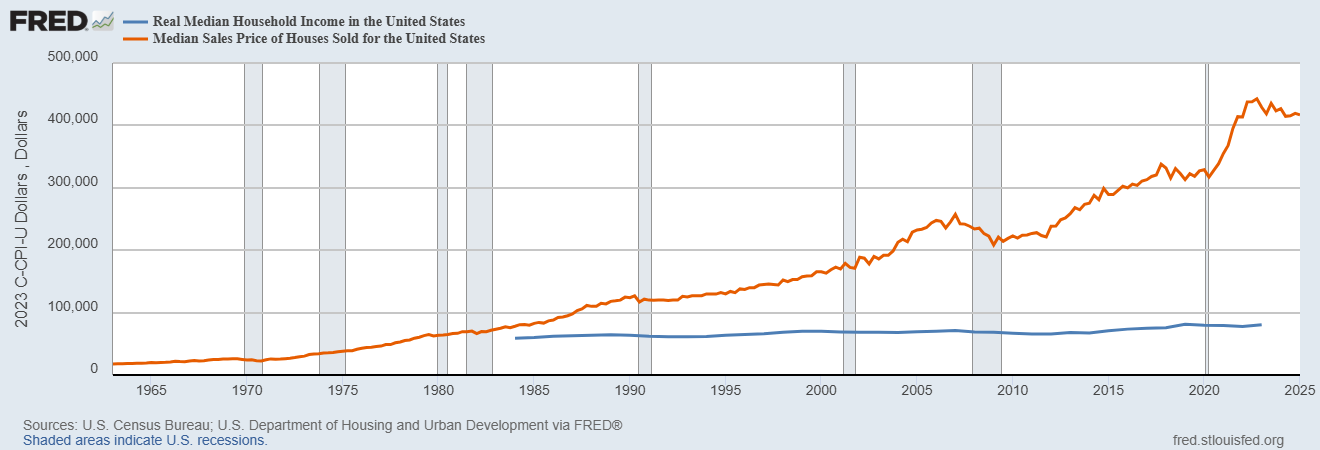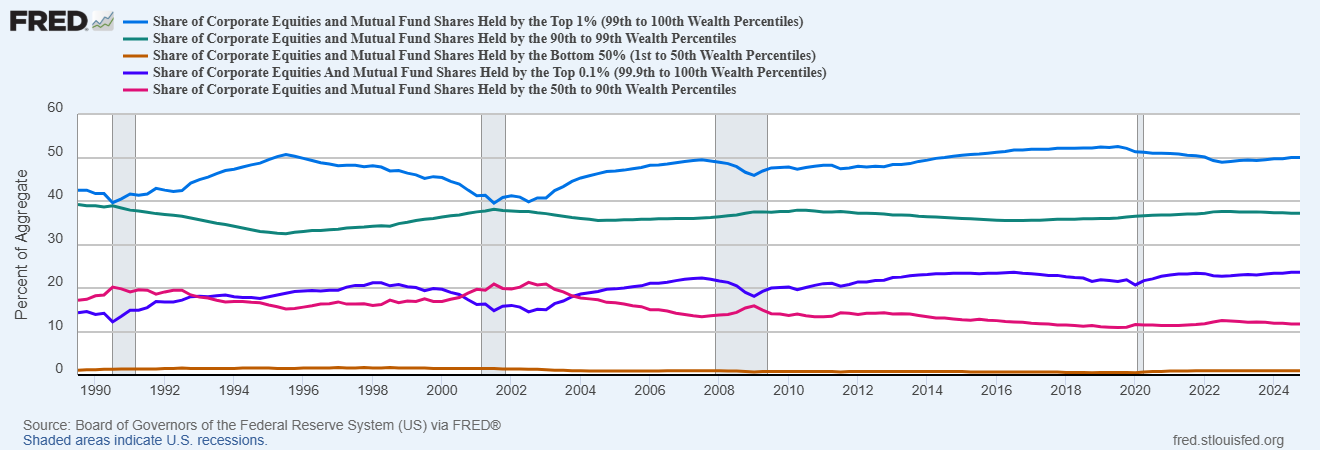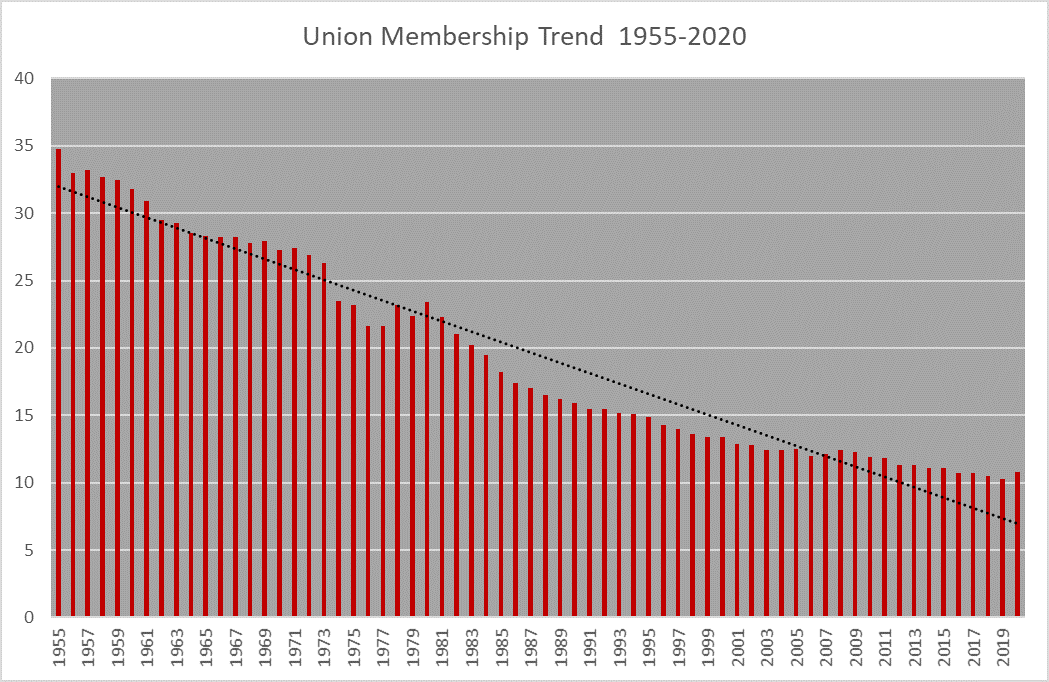The Great Companies - How Wealth Shows The Crisis of Unaffordability
In 1939, American author John Steinbeck wrote: “The great companies did not know that the line between hunger and anger is a thin line.” A possible means of measuring monopolies’ effects is to look at some stats that show the inflation, poor outcomes, and lack of affordability for the mass of Americans to afford their own republic (if they can afford to keep it now):





Where It Began and How It’s Going
While this may be a LOT of information to start with, one may see a correlation between the modern “economic success” mindset of both parties, the hijacking of American government by private interests, and the decline of American trust in government, record low belief in the American Dream with 47% saying it is “no longer” or was “never possible”, and the low happiness index as signs of failing politics. But there is one point where all of this have originated; a time where the power of corporations and a pseudo-corporate government bent on economists and lobbyist began. The 1971 landmark case Buckley v Valeo decided the following:
“First, it held that restrictions on individual contributions to political campaigns and candidates did not violate the First Amendment since the limitations of the FECA enhance the "integrity of our system of representative democracy" by guarding against unscrupulous practices. Second, the Court found that governmental restriction of independent expenditures in campaigns, the limitation on expenditures by candidates from their own personal or family resources, and the limitation on total campaign expenditures did violate the First Amendment.”
- Oyez
Essentially, individuals could be limited to a certain amount of campaign contributions, and it was unconstitutional for Members of Congress to spend limitless resources of their own. This perhaps made it hard for Congressional officials to fund their campaigns with limited citizen contributions. In a republic by the people, with a less than 10% trust in Congress, it is right that Open Secrets mentions that in 2024: “Just 1.05% of the United State population contributed more than two hundred dollars to federal candidates, PACs, parties and outside groups in 2023-2024. These…gave a hefty 78.45% of all contributions.” The solution in this dilemma? Oyez writes on the 2010 landmark ruling in Citizens United v Federal Election Commission:
“…the majority held that under the First Amendment corporate funding of independent political broadcasts in candidate elections cannot be limited…The majority maintained that political speech is indispensable to a democracy, which is no less true because the speech comes from a corporation. - Oyez.
Can We Pinpoint Corporatism As The Cause?
I learned an important phrase in my college stats course: “correlation does not equal causation.” This is used in American legalism, the economy, and everywhere else. Just because two things show up in the same place does not mean there is a cause and an effect. Without going into too much I can simplify an easy way to perhaps narrow it down. An article on monopolies specified numerous areas where corporations can own perhaps up to 90% of the markets, these high rollers need a lot of money to make a lot. It is easy to assume, as Harvard Business Review confirms, that these profits must go toward ensuring good policy keeps the profits up, to hell with" “how the other half lives” as Jacob Riis once eloquently titled his book. One Kansas University study found that: “firms lobbying for this provision have a return in excess of $220 for every $1 spent on lobbying, or 22,000%.” There may be a lot of spurious coincidences, but I think recent studies where nearly 10% more blame corporations and lobbies for political problems than their own government, may be enough proof regardless of coincidences. Even Republicans in these polls showed majority agreement.
The Risk and the Plan Forward
To keep this portion short, the issue with 0.1% and even 10% controlling government policy is it keeps government accountable to those select few. Oppression and repression by the irate minority who control the banks, the media, the lobbies, the corporations, the manufacturing, is risky, and something our founders fought against. I have no issue with free market-ism and stand with capitalism, but this is not an issue of economics, this is about the financialization of a “non-financial” representative government. The solution I propose is not one of impossibility, and has three steps:
People should stop voting for candidates backed by corporate or elite money. It is hard to steal, let alone win an election, when one has no votes. Election Day may not be a holiday, but not everyone celebrates Christmas either. Forcing the hand of our legislators may be necessary to ensure they get in line. Perhaps even going out and primarying them with a better option is good. Stop voting on name and give someone without connections a chance.
Second, we should seek avenues to force large firms like the Federalist Society (who got Neil Gorsuch approved to the Court because of his family’s long time connections in working for prior Republican Presidents as his own mother did for President Reagan in the EPA), and their liberal counterparts to push for nominees who are both anti-trust and anti-monopoly. We HAD justices like this in the Teddy Roosevelt era, TR’s VP, Taft, was a justice who championed ending corporate ownership of government and established better working conditions before being run with Teddy.
If this is not possible then we should use the same playbook. When centralized money and connections are what get people to listen and win, then the people should form their own “nonpartisan” interest to nominate justices to the President. It takes “$10,000 to buy a Senator” as a former BlackRock employee mentioned. It takes 100 citizens, $100 a piece to win one in every election. Money talks, and politicians are obviously loyal to their donors. If citizens can compete with the same tactics, then their own institutes must be formed to ensure they get a Congress to approve better nominees or every justice nominated is theirs.
It may not be an easy solution, but it took Teddy and Taft eight years to break up monopolies that took another twenty to amass back. Perhaps several years of trying is what it’ll take to ensure even a century of true America first politicians, people who put US back in the U.S., not just a catchy slogan for conservatives).





